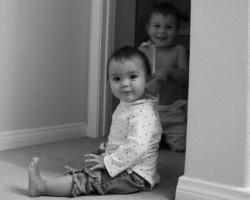Fibs are a universal feature of childhood, but a controversial new book suggests children start fibbing at a much younger age than previously thought, even as young as 8 months old. Published this week by Harvard University Press, How Infants Know Minds, by Vasudevi Reddy, a professor of developmental and cultural psychology at the University of Portsmouth, details how children use deception.
Reddy describes how babies as young as 8 months can fake crying and laughter. She talks of 9-month-olds who, unwilling to stop playing, feign deafness despite their mothers’ calls; and of babies not yet 1 year old acting innocent when caught doing something forbidden. By the time the children in Reddy’s studies were 2 they were indulging in face-saving lies, often ready to blame siblings, to avoid punishment.
However, as familiar as Reddy’s observations may seem to many of us, she is challenging the established line. The conventional view suggests children are capable of genuine deception only once they have developed a “theory of mind.” This means they understand people have different beliefs from their own. This develops from about 4 years old, and so, according to exponents of the theory, children cannot lie until that age.




